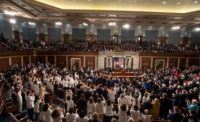
In his State of the Union address, President Obama called on Congress to move rapidly this year on major infrastructure legislation and pledged to issue a directive to raise the minimum wage for employees of federal contractors in construction and other service industries.
The flurry of statements from design and construction groups reacting to the Jan. 28 speech contained words of praise for Obama’s references to public works—especially urging lawmakers to wrap up new surface transportation and water resources measures this summer. But industry organizations also said that the administration must provide more details, especially about infrastructure funding.
In addition, construction officials said the minimum-wage plan probably would have a limited impact on the industry.
Construction officials took notice early in the speech when Obama said, “We’ll need Congress to protect more than three million jobs by finishing transportation and waterways bills this summer--That can happen.”
Both measures have a ways to go. The Senate and House did pass new water resources bills last year by wide margins. But negotiations to reconcile the two bills’ differences have shown little progress since the talks began last November.
Lawmakers also face a tight deadline to produce a new highway-transit authorization bill. The current statute, the 2012 Moving Ahead for Progress in the 21st Century Act (MAP-21), lapses on Sept. 30. With about eight months to go, key committee chairs have not yet introduced their post-MAP-21 proposals.
To fund increased spending on infrastructure such as highways and ports, Obama again said he wanted to use tax policy changes‑closing loopholes that benefit companies that earn profits and “ship jobs” outside the U.S. But that proposal has made little progress in Congress so far.
House Transportation and Infrastructure Committee Chairman Bill Shuster (R-Pa.) said: “I welcome the President’s interest in improving our infrastructure. We have significant long-term infrastructure needs that must be addressed and responsibly paid for to improve our economic competitiveness, efficiency and quality of life.”
But Shuster, the key House lawmaker on the transportation and water resources bills, added that “instead of showing leadership on these critical issues, the President offered little more than recycled sound bites from old speeches.”
Pete Ruane, American Road & Transportation Builders Association CEO, commended Obama for again underscoring the need to upgrade U.S. infrastructure. But Ruane added, “Now we would like to see specific plans about how Congress and the President plan to tackle the underlying problem: the need for new, long-term revenues.”
Ruane noted that the Highway Trust Fund’s highway account is now projected to start showing a deficit as early as August—a bit sooner than had been forecast last summer.
Terry O’Sullivan, Laborers’ International Union of North America general president, said he hoped that Obama’s comments will “start the engine” for MAP-21’s successor.
To strengthen the trust fund, O’Sullivan recommends increasing fuel taxes to account for inflation and infrastructure banks and loan programs to spark more public-private transportation partnerships.
Echoing Obama’s general comment in his speech that this year would be “a year of action,” American Society of Civil Engineers President Randall S. Over said, “For highways and bridges, 2014 must become a ‘year of action.’”
Without a Highway Trust Fund fix, he added, state transportation agencies “face huge cuts in capital funding by the end of this year….”
Stephen Sandherr, Associated General Contractors of America CEO, was encouraged to hear Obama single out transportation and water resources bills, but he also is seeking more specifics.
Sandherr said AGC expects that Obama’s fiscal year 2015 budget proposal will “provide additional details about how to address chronic revenue shortfalls that once again threaten the viability of the Highway Trust Fund.”
Continuing a theme that ran through the speech, Obama added that he would not rely on congressional action on transportation. He said he would “act on my own to slash bureaucracy and streamline the permitting process for key projects, so we can get more construction workers on the job as fast as possible.”




